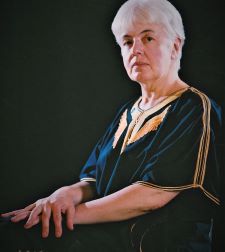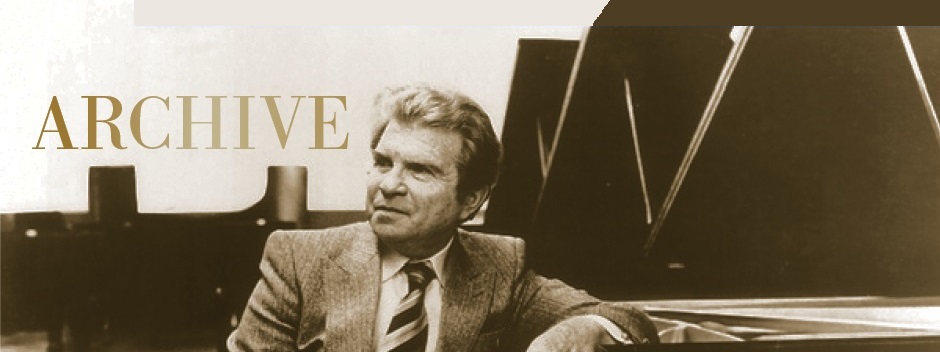
Marina Mdivani
Because the thoughts below are only concerned with E.G. Gilels as a pedagogue, I will only speak about that which is linked to Gilels’s work in class as a teacher of music. Thus, I leave aside his influence manifested as a result of his concert appearances.
Out of caution, it must be noted, that the material offered here could be seen as flawed: I was, after all, the subject of Gilels’spedagogical process during these lessons, and not a distanced observer of that process. Even in those occasions when the professor was teaching other students (needless to say, I tried not to miss these) I was more taken by the interpretational aspects of the music, than questions of pedagogy.
⚬ Gilels does not like it when he is being copied. Impersonation is the greatest danger because it can even happen unwillingly when you are dealing with such a great artist. Gilels kept to the principle of Mayakovsky: ‘Do not do in the vein of Mayakovsky, do your own.’
⚬ Gilels was diligently conscious of his interpretations. His need to seek out a tangible meaning for himself meaning meant that he immediately felt the smallest, even unconscious, attempt to copy and put a stop to it (of course, we are not talking about general interpretational concepts here). Gilels tries to develop the independence of the student to the highest degree. Doing so, if the student’s overall conceptual understanding of the work is in principle satisfactory, then Gilels’ remarks and instructions are always directed towards bringing that interpretation into a more polished form. His uncanny ability to embody the logic of another point of view – in this case, of the student – allows him to develop and deepen the interpretational integrity of that work from that particular perspective.
⚬ Gilels knows the potential of the student better than the student himself. For this reason, to instil independence in his students, he can listen to a student in a lesson and then not give any directions whatsoever about how they should continue to work on the music. As a result of this the student develops much faster because not only does the student gain independence, but also the professor’s time is not wasted on talking about things that the student can do themselves. For example, I prepared Prokofiev’s Eighth Sonata independently (in my fourth year of studying with Gilels). Gilels listened to it from beginning to end and did not make any detailed observations. He said I played it indifferently, although formally everything was there. He suggested I play it again in our following lesson. I remembered one remark: ‘[You are] a young woman, but play like an old crone!’ I deduced the necessary amendments, and in the next lesson Gilels was generally pleased with my playing; and immediately moved onto making important specific remarks about certain passages. Of course, if Gilels did not think that my playing was lower than my capabilities, and did not think I could have independently do something myself to fix it, he would have immediately moved onto giving specific instructions.
⚬ In his work with other students the same could be observed: he approached each one as a individual and his aim was to make each one do everything in their power for themselves, even though that ‘for themselves’ – in a musical sense – was significantly less than wha Gilels would subsequently give to them during the process of working with them. It is incredibly hard to describe this in words because we – his students – instantly feel from just a few words of Gilels’s words, by the inflection of his voice, by his gestures (they were very expressive) what our professor wanted from us. (As an aside, any musician will know that every class develops their own ‘language’ or ‘jargon’, their own particular way of expressing things, and this immensely helps the teacher-student relationship). I particularly love his criticism about the pedal: ‘Don’t hit the accelerator!’
⚬ Because Gilels only teaches at the Conservatory every student coming to him had at least on pedagogue prior to him, and sometimes more. It is clear that, however unwillingly, Gilels enters into a kind of ‘correspondence’ with the previous pedagogue: in other words, in every students ‘sits’ the past teacher or teachers, and of course, this presents a complex pedagogical conundrum for Gilels. In truth, I was lucky in this respect. Even though I had studied for twelve years in Tbilisi with the Honoured Pedagogue E.V.Chernyavskaya, and then for a further four in the Conservatory with Y.I. Milstein before my studies with Gilels (i.e. I had two teachers), there was no ‘breaking in’, but a beginning of something new. Gilels did not reject what I had, but gave me so much more – beyond what I thought possible – of what I did not have.
⚬ Sometimes the opposite situation unfolds: when the student comes with the kind of preparation that the only possible way forward is to redo the groundwork. In those cases Gilels never permitted himself to use his authority as an eminent musician to order someone to play exactly in one way, and not another. Quite the opposite – his directions about technical issues, or emotional character; sometimes through humour; sometimes with logical rationalisation he would bring the student around to what the student began to understand for themselves was necessary. Crucially, the student would see the path and reasons for that reconstruction.
⚬ Demonstration of works: Gilels never plays with the student, and is very reluctant to demonstrate. I think this is because he does not want to crush the individuality of the student – and this danger is indeed great when you hear the interpretation of such a great artist. Generally, Gilels only demonstrates in two cases: firstly, if he wants to show a particular technique that the student is, as yet, unaware of so that they can appreciate the necessary sound of it; and secondly, when he wants to ignite the emotions of the student (‘shake up’) the student. In the latter case, Gilels does not always even play what the student was playing in that moment. For instance, when we were working on Tchaikovsky’s First Piano Concerto, Gilels played a lot of his music to me, but nearly nothing from the Concerto itself.
⚬ Working on a piece: Gilels always sought the most diligent work and finesse, and would not allow a single empty, thoughtless note. Yet, I would add, that this kind of ‘digging’ in the minute details of the work (there are lessons where only 2-3 pages are covered at best) somehow brings hugely advantageous gains that cannot be achieved just by playing longer passages. I cannot formulate exactly how Gilels achieves this (if I knew I would have become a great pedagogue), but somehow this focused study of a passage brings a much deeper understanding of the work as a whole. Gilels always demands and strives for a wholeness of thought, and if possible, a ‘cross-cutting’ vision: he never allows the student to ‘miss the wood for the trees’. To continue the analogy, he teaches to admire the wood in a way that sees the beauty of every single tree. Moreover, in studying a body of works in this way gives students a solid foundation that lets them become more and more independent in expanding their repertoire, and to maintain the quality of their interpretation.
⚬ Some miscellaneous remarks: Gilels demands from the student the following (obviously Gilels only mentioned these issues in those cases where it was necessary to correct the faults of students, and so what I go on to say absolutely cannot be taken as an attempt to rationalise Gilels’s own musical concepts):
⚬ ⚬ any interpretation, no matter how interesting, cannot redeem dirty playing, and conversely, no accuracy in the playing is needed if it does not illuminate the interpretation. It seems obvious, yet, musicians are often criticised for the latter, but the former is usually ignored and attributed to ‘tempestuous inspiration’. In this context the demand that the head and fingers are equally perfect is not so trivial. In this respect Gilels made it clear that a student should see each technically challenging passage as having crucial part in the melodic unfolding of the work. I can give the following example: the octaves in Tchaikovsky’s First Piano Concerto, and in Liszt’s Sonata Gilels said that they should be played like a melody. This corresponds to his demand for logically moderate tempi (i.e., he allows one to play only as fast as is possible without losing the melodic line).
⚬ ⚬ The fact that Gilels is a concertizing pianist gives him the ability to share with his students the results of his longstanding experience. Usually, students do not have a significant experience of performing with an orchestra, and Gilels would always give advice when teaching piano concertos about the specifics of the different orchestral groups (their tempo and timbral characteristics and limitations and so on).
⚬ ⚬ Gilels nurtures in his students a humbleness in their artistry. He does so not only because it is a morally positive stance, but because it allows the musician to fully open up their individual potential on the stage.
In essence, Gilels does not have any specific pedagogical requirements. If one was to formulate the demands that Gilels places on his students then it would become clear that they are known to any cultured musician. The strength of Gilels as a pedagogue is in that in class he never, not even for a mere second, departs from those founding principles and makes sure they themselves hold true to theirs for the entirety of their lives. In respect of the purely musical aspects of specific pieces, the refinement of details, the grasp of the music as a whole, and various technical devices etc., then here the strength of Gilels is in that he always knows ‘how to do it’, and in that he derives this from the musical persona of the student without forcing upon that student his own will. Instead Gilels enriches the student through bestowing upon him the fortune of communicating with a musical colossus.


